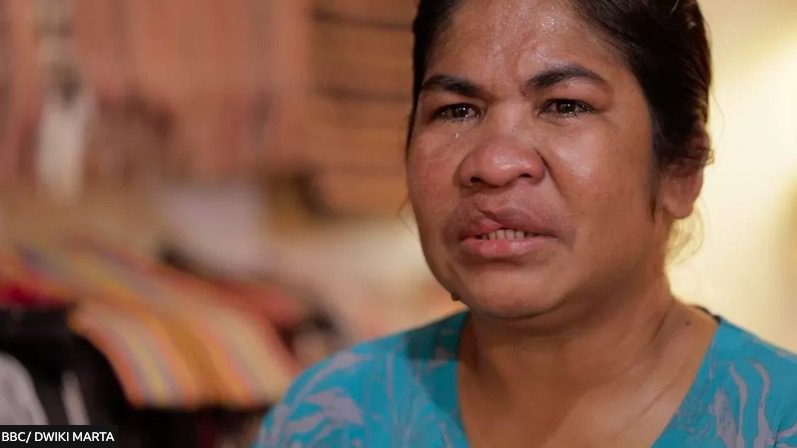
‘Why did you torture me?’: A domestic worker’s fight for justice
“Help me, I am being tortured by my employer,” Meriance Kabu wrote. “I’m covered in blood every day, help me!”
She then quickly folded the note and threw it out of the locked iron gates of the apartment in the suburbs of Kuala Lumpur where she was working as a live-in maid.
A woman passing by picked it up. Once she read it, she immediately took it to a retired police officer who lived in the same flats. “If she had stayed there, she surely would have died,” he later said.
That same day, 20 December 2014, Malaysian police knocked on the door of the apartment where Meriance lived. She hadn’t left it in eight months.
“I felt like I was falling,” she says, recalling the moment when she saw the officers. “They said, ‘Don’t be afraid, we are here’. At that moment I felt strong again. I felt like I could breathe again. The officers called me closer and I told them the truth.”
This story contains details some readers may find distressing.
Nine years on, Meriance is still fighting for justice. Her case, which is far from unique, reveals just how vulnerable undocumented migrant workers are and how often justice eludes even those who survive to tell their story.
In 2015, police charged Meriance’s employer, Ong Su Ping Serene, with causing grievous hurt, attempted murder, human trafficking and immigration violations. She pleaded not guilty.
Meriance testified in court before finally returning home to her family. Two years later she got news from the Indonesian embassy that prosecutors had dropped the case citing insufficient evidence.

“The employer walked free, where is the justice?” asks the country’s ambassador to Malaysia, Hermono (many Indonesians go by a single name) who met Meriance in October.
The embassy has hired legal advice for her and has been lobbying for the case against Meriance’s employer to be resumed.
“What was the reason for the delay? Isn’t five years enough time? If we do not keep asking, it will be forgotten, especially since Meriance has already returned home.”
It’s unclear why so few abuse cases end in prosecutions in Malaysia but campaigners point to a culture which views domestic workers, most of whom are Indonesian, as second-class citizens not worthy of the same level of protection as Malaysians.
Malaysia’s foreign affairs ministry told the BBC “they would ensure that justice will be served according to the law”.
In 2018 an Indonesian court jailed two men for trafficking Meriance. The judge ruled that she had been sent to work in Malaysia “as a maid for Ong Su Ping Serene who tortured her, causing serious injuries” that put her in hospital.
Meriance’s ordeal was described in disturbing detail in the verdict, which said the employer had severely beaten her, breaking her nose in one instance, and had often tortured her with a hot iron, tweezers, hammer, baton and pliers.
Eight years on, her body still bears the marks of this torture. There’s a deep scar on her upper lip, four of her teeth are missing and one ear is deformed.
Her husband Karvius said he couldn’t recognise her after she was rescued: “I was so shocked when they showed me pictures of Meri at the hospital.”
Last year, Malaysia and Indonesia signed an agreement to improve the condition of Indonesian domestic workers in the country. Indonesia is now lobbying for the case against Meriance’s employer to be resumed.
Undocumented workers like her are especially vulnerable because their passports are taken away and they live with the employer in a foreign country, leaving them few options to seek help.
“Everyone needs to take more responsibility,” says Malaysian MP Hannah Yeoh who wants to see an end to what she describes as a cultural of silence in the country around the abuse of domestic workers.
Malaysia’s ministry of manpower says there are more than 63,000 Indonesian domestic helpers in their country, but that does not include undocumented workers. There are no clear estimates on their numbers. The Indonesian embassy says it has received reports of nearly 500 cases of abuse in the last five years.
That figure is just the “tip of the iceberg”, says Ambassador Hermono, because so many cases, especially those involving undocumented workers, still go unreported.
“I don’t know when this will end. What we know is that there are more and more victims – from torture, non-payment of salaries and other crimes.”
The embassy hasn’t kept track of how many abuse cases have resulted in a prosecution. But there have been some high-profile verdicts. In 2008 a Malaysian woman was sentenced to 18 years in jail for torturing her Indonesian maid. Six years later a couple was sentenced to death for murdering their Indonesian domestic worker.
‘I will fight until I die’
“I will fight for justice until I die,” Meriance says. “I just want to be able to ask my former employer, ‘Why did you torture me?'”

She was 32 when she decided to seek work abroad so that “the children would no longer cry for food”. Life was tough in their village in West Timor, where there is no electricity or clean running water. And her husband’s wage as a day labourer wasn’t enough to support their family of six.
She took up the offer of work in Malaysia and dreamed of building a home for her family.
When she arrived in Kuala Lumpur in April 2014, the agent took her passport and handed it over to her employer. Recruiters in Indonesia had already taken her phone.
But Meriance was hopeful of a better life. Her job was to “look after grandma”, her employer Serene’s mother, who was 93 years old at the time.
Three weeks after she started her job, she says, the beatings began.
One evening, Serene wanted to cook fish but couldn’t find it in the refrigerator because Meriance had mistakenly put it in the freezer. Suddenly, Meriance says she was struck by the frozen fish. Her head started to bleed.
After that, she says, she was beaten every day.
She says was never allowed to leave the apartment. The iron gate to the flat was always locked and she didn’t have a key. Four of the neighbours who lived in the same block didn’t know of her existence until the day the police arrived.
“I only saw her the night she was rescued,” one of them said.
Meriance says the torture and beatings only stopped when her employer grew tired. She then ordered Meriance to clean up her own blood that had splattered on the floor and walls.
There were times, she says, when she thought about ending her life, but the thought of her four children back home kept her going.

“I also thought about fighting back,” she said. “But if I fought, I would have died.”
Then one day – at the end of 2014 – she looked at herself in the mirror and felt something change: “I couldn’t take it anymore. I was angry, not with the employer. I was angry with myself. I had to dare to try to get out.”
That’s when she wrote the letter that would free her.
The BBC made multiple attempts to reach her employer Ong Su Ping Serene for her response to the allegations, but she declined to do so.
Meriance says her fight for justice is also on behalf of others like her – and those who didn’t make it.
Ambassador Hermono is handling another case of a domestic worker who he says was tortured “beyond human reason” and starved. She weighed just 30kg when she was rescued. Her employer is currently on trial.
But there are those like 20-year-old Adelina Sau who weren’t rescued in time. She was allegedly starved and tortured by her employer, which led to her death.
Her employer was charged with murder but in 2019 the prosecution withdrew the charges. An appeal to reopen the case was rejected last year.
Adelina was from the same district as Meriance in West Timor.
Meriance says she met Adelina’s mother in their village and told her, “Even though your daughter is dead her voice is in me.”
